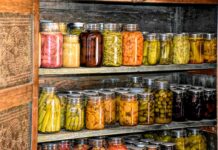One of the easiest ways we can all contribute to natural resource conservation is to reduce our waste.
Americans generate more municipal solid waste (trash) per capita than any other country in the world. As a society, we need to work together to better manage our waste. That’s why it was so encouraging to learn the 2022 Envirothon competition would have high school students from all over Ohio studying the issues surrounding waste.
What is Envirothon?
The Envirothon is an international, academic, outdoor competition for high school students, which is designed to stimulate, reinforce and enhance interest in the environment and natural resources. The Envirothon tests students’ knowledge of natural resources in five categories: soils, wildlife, forestry, aquatics and current environmental issues. Students compete through team problem-solving activities. Competitions begin at a local level; in Ohio we have five local SWCD areas. Winning teams from each of the five areas advance to the state Envirothon competition and the winning state team advances to the national event.
The current environmental issue students are learning about for the 2022 competition is titled: Waste to Resources. Students participating in the Envirothon competitions will learn the concepts of different waste streams and the impacts of waste generation and disposal on natural resources and society. Students will also learn effective ways to manage waste regeneratively, as well as the social, economic and political impacts of turning waste products and degraded lands into resources.
A missed opportunity
The study materials that were created to support the Waste to Resources topic were successful at providing an overview of the role of local, state and federal government in managing waste. They were also successful in introducing a young population to many different types of waste and waste management strategies. There was plenty of good information about food waste and composting; combustion with energy recovery; human and animal waste treatment; landfills and hazardous materials; and restoration of degraded lands; reuse, recycling and waste diversion, etc.
However, the study materials fell short in the same way most waste messaging seems to fall short — and that is in the simple concept of waste reduction. After all, waste management would be a lot easier if there was just less to manage.
We are a very wasteful society. In 2017, Americans generated 4.5 pounds of daily waste per capita. In 2018, that number rose to 4.9 pounds daily per individual. In 2018, about 146.1 million tons of MSW were landfilled in the U.S.
Food was the largest component at about 24%. Single-use plastics and paper (including paperboard) were the second and third largest waste items. We are missing an opportunity when we neglect to directly address waste reduction at the source. We are the source.
Far-reaching impacts
Consider some of the additional impacts of food waste — wholesome food that could have helped feed families in need is sent to landfills. The land, water, labor, energy and other inputs used in producing, processing, transporting, preparing, storing and disposing of discarded food are pulled away from uses that may have been more beneficial to society.
Instead of those finite resources being used in a beneficial way, the carbon emissions produced by processing and transporting this waste to landfills have negative impacts on our climate. Additionally, food waste in a landfill quickly generates methane. As it relates to climate change, atmospheric methane is 34 times more problematic than C02, and landfills are the third-largest source of methane in the United States.
We should also consider the impact to natural waterways in food production. Much of our nation’s produce is grown in western states where water scarcity is increasing with each passing year. We are pumping water out of the ground and diverting water from rivers and lakes — water systems that support the entire ecosystem in a community to grow food that is being sent to a landfill.
Doing better
We need to do better. We can do better. Think before you purchase food that you will not have time to prepare and consume. Think before you toss food in the trash — consider composting appropriate food waste. Be mindful of what it is that you are discarding most frequently and let that be a starting point for reduction strategies in your home.
The second and third largest MSW categories were plastic (18%), and paperboard and paper (12%). Both plastic and paper waste are easy to reduce if you are willing to change a few habits. So often our habits are more routines that we have fallen into than they are well-thought-out decisions. Do we really need to have coffee every day in a disposable cup with a plastic lid? Many businesses are happy to provide service to customers by bringing reusable cups to the counter.
As for paperboard waste, many Americans have shifted to online purchases with packages arriving at our front door. By being better planners, we could probably shop more efficiently and order supplies in a way that would have more items arriving in one package instead of several. Our consumer habits are continually analyzed and then used in predictive models and marketing strategies. Support businesses and products that make the effort to conserve natural resources.
Waste is a choice
However, if we are honest in our examination of our waste problem, we will quickly realize landfills are really filled with individual choices. Every single unit of trash represents a choice — and many of them are your choices. This should come as encouraging news because in a democratic society, we have a lot of freedom in the choices we make. So, we can make different choices, much better choices. After all, there is no honor in waste.













